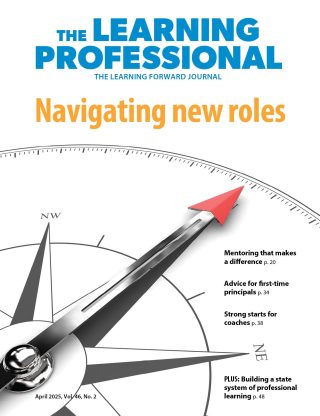FOCUS
All together now
Internal coherence framework supports instructional leadership teams
By Elizabeth Leisy Stosich, Michelle L. Forman and Candice Bocala
June 2019
Vol. 40, No. 3
Read the remaining content with membership access. Join or log in below to continue.
Sed ut perspiciatis unde omnis iste natus error sit voluptatem accusantium doloremque laudantium, totam rem aperiam, eaque ipsa quae ab illo inventore veritatis et quasi architecto beatae vitae dicta sunt explicabo. Nemo enim ipsam voluptatem quia voluptas sit aspernatur aut odit aut fugit, sed quia consequuntur magni dolores eos qui ratione voluptatem sequi nesciunt. Neque porro quisquam est, qui dolorem ipsum quia dolor sit amet, consectetur, adipisci velit, sed quia non numquam eius modi tempora incidunt ut labore et dolore magnam aliquam quaerat voluptatem.
GET THE SURVEY
Download the Internal Coherence Survey at ic.serpmedia.org/assets/internal_coherence_survey_october2016.pdf.
References
Cohen, D.K. & Ball, D.L. (1999). Instruction, capacity, and improvement (CPRE Research Report Series RR-43).
Philadelphia, PA: Consortium for Policy Research in Education.
Elmore, R.F., Forman, M.L., & Stosich, E.L. (2016). The Internal Coherence Survey. Washington, DC: SERP Institute. Available at ic.serpmedia.org/assets/internal_coherence_survey_october2016.pdf.
Forman, M.L., Stosich, E.L., & Bocala, C. (2017). The Internal Coherence Framework: Creating the conditions for continuous improvement in schools. Cambridge, MA: Harvard Education Press.
Goddard, R.D., Hoy, W.K., & Hoy, A.W. (2004). Collective efficacy beliefs: Theoretical developments, empirical evidence, and future directions. Educational Researcher, 33(3), 3-13.
Ingersoll, R., Sirinides, P., & Dougherty, P. (2017). School leadership, teachers’ roles in school decisionmaking, and student achievement. Working Paper (#WP 2017-2). Philadelphia, PA: Consortium for Policy Research in Education, University of Pennsylvania.
Louis, K.S., Dretzke, B., & Wahlstrom, K. (2010). How does leadership affect student achievement? Results from a national US survey. School Effectiveness and School Improvement, 21(3), 315-336.
Recent Issues
LEARNING DESIGNS
February 2025
How we learn influences what we learn. This issue shares essential...
BUILDING BRIDGES
December 2024
Students benefit when educators bridge the continuum of professional...
CURRICULUM-BASED PROFESSIONAL LEARNING
October 2024
High-quality curriculum requires skilled educators to put it into...
LEARNING TO PIVOT
August 2024
Sometimes new information and situations call for major change. This issue...












